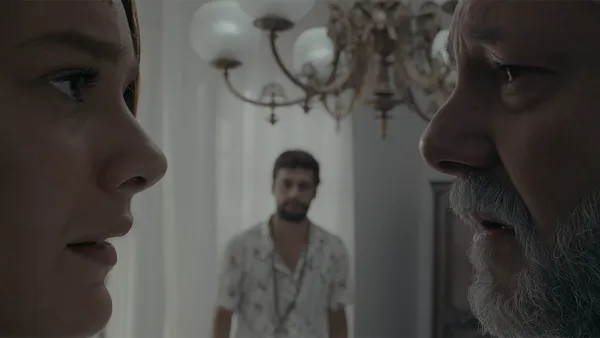Eye For Film >> Movies >> The Seeker (2019) Film Review
The Seeker
Reviewed by: Amber Wilkinson

South American films about political corruption are in vogue at the moment - with recent considerations including Federico Veiroj's The Moneychanger, Benjamín Naishtat's Rojo and much of the output of Pablo Larraín.
Brazilian actor/director Bernardo Barreto's debut film The Seeker (O Buscador) also uses it for its backdrop, although this time the focus is as much on the family and social politics of the bourgeoisie as anything that goes on outside those closed doors. And the doors themselves are crucial to both the mood and the structure of The Seeker, as Isabella (Mariana Molina) returns to her family's home after four years of living in a free love community with her counter-culture boyfriend Raji (Pierre Santos) for Father's Day.

As they enter the mansion's gate - which is surrounded by protesters calling for the arrest of her dad Afonso (Mário Hermeto) - there's a distinct shift in mood, from the free and easy place where the pair live to the confines of Isabella's former life, where even names are changed, with Isabella insisting Raji use the name Giovanni. The camera, too, switches to a single take and for the next hour or so, it will float through the household's machinations, stewing us in their secrets and lies.
From the off, it's clear that Giovanni's relaxed approach, greeting everyone, including the hired help, with a hug, is diametrically opposed to the "polite society" values that Afonso, his wife (Debora Duboc) and family have constructed as carefully as walls. We sense these "good mannered" interactions are as much about controlling the tensions between Isabella's brother Thiago (Bruno Ferrari), his wife Adriana (Aline Fanju) and young son Otávio (Luiz Felipe Mello) as they are about social necessity. The arrival of family friend Max (Erom Cordeiro), his trophy, vlogger girlfriend Sabrina (Monique Alfradique), along with a suggestion from family lawyer (Leonardo Netto) only serves to fan the flames.
Barreto is by no means the first director to show that what goes on behind the closed doors of the upper middle classes can be every bit as corrupt and unpleasant as what they choose do on a political stage but having cinematographers Ulrich Burtin and Luca Pougy shoot the gathering in a single take is an audacious move that pays off. The timing between camera and cast makes it feel as though there is barely a moment when some crack in the facade of privileged living isn't being pried open - whether it's the waiter sneaking a spoonful of caviar or family members revealing just how far they will go to preserve their way of life. He never forgets the protesters outside the family gate, using their chants to fuel the atmosphere, and a sudden switch to first-person point of view also comes at the perfect moment.
Barreto won a Special Jury Prize for his script in Tallinn, where his film - which, remarkably, was shot in only three days - had its world premiere. It could easily pick up quite a few more for its direction and technical achievements as it makes its way around the festival circuit.
Reviewed on: 03 Dec 2019















